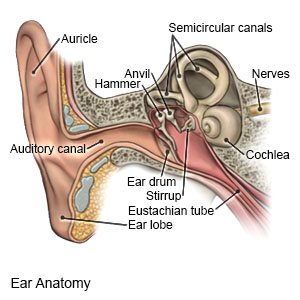Cochlear Implant Surgery in Children
Medically reviewed by Drugs.com. Last updated on Apr 6, 2025.
Cochlear implant surgery is used to place a cochlear implant in one or both of your child's ears. A cochlear implant is an electronic device that helps improve hearing in people who have severe hearing loss. A cochlear implant will not restore normal hearing, but it may help your child better understand speech and lip movements. Have any ear pain or redness checked right away. Your child may have an ear infection that needs immediate care.
 |
DISCHARGE INSTRUCTIONS:
Seek care immediately if:
- Clear fluid leaks from your child's ear or nose.
- Your child's face is numb, or he or she cannot move parts of his or her face.
- Your child has a severe headache.
- Your child's neck feels painful or stiff.
Contact your child's healthcare provider if:
- Your child has pain and redness in his or her ear.
- Your child has a fever, chills, and feels weak and achy.
- Your child's wound is red, swollen, or draining pus.
- Your child feels dizzy or has nausea and is vomiting.
- Your child feels more sleepy than usual.
- You have questions or concerns about your child's condition or care.
Wound care:
Carefully wash the wound with soap and water. Dry the area and put on a new, clean bandage as directed. Change your bandages when they get wet or dirty.
Vaccines:
A cochlear implant increases your child's risk for meningitis. Your child may need a pneumococcal vaccine. Ask which vaccine is right for your child and when he or she should receive it.
Speech therapy:
Your child will go to training to learn how to listen and understand sounds using the cochlear implant. If your child was born deaf, he or she will have to learn to understand what the sounds mean. An auditory or speech therapist will help your child. The therapist can also help your child speak clearly. Your child may have lost his or her hearing at an older age. Therapy can help him or her interpret sounds coming from the cochlear implant.
Follow up with your child's surgeon or ear, nose, and throat specialist as directed:
Your child may need to return to have the stitches removed. He or she will also learn how to care for the cochlear implant. Your child will need regular checkups to make sure the cochlear implant works properly. Write down your questions so you remember to ask them during your child's visits.
© Copyright Merative 2025 Information is for End User's use only and may not be sold, redistributed or otherwise used for commercial purposes.
The above information is an educational aid only. It is not intended as medical advice for individual conditions or treatments. Talk to your doctor, nurse or pharmacist before following any medical regimen to see if it is safe and effective for you.
Further information
Always consult your healthcare provider to ensure the information displayed on this page applies to your personal circumstances.
